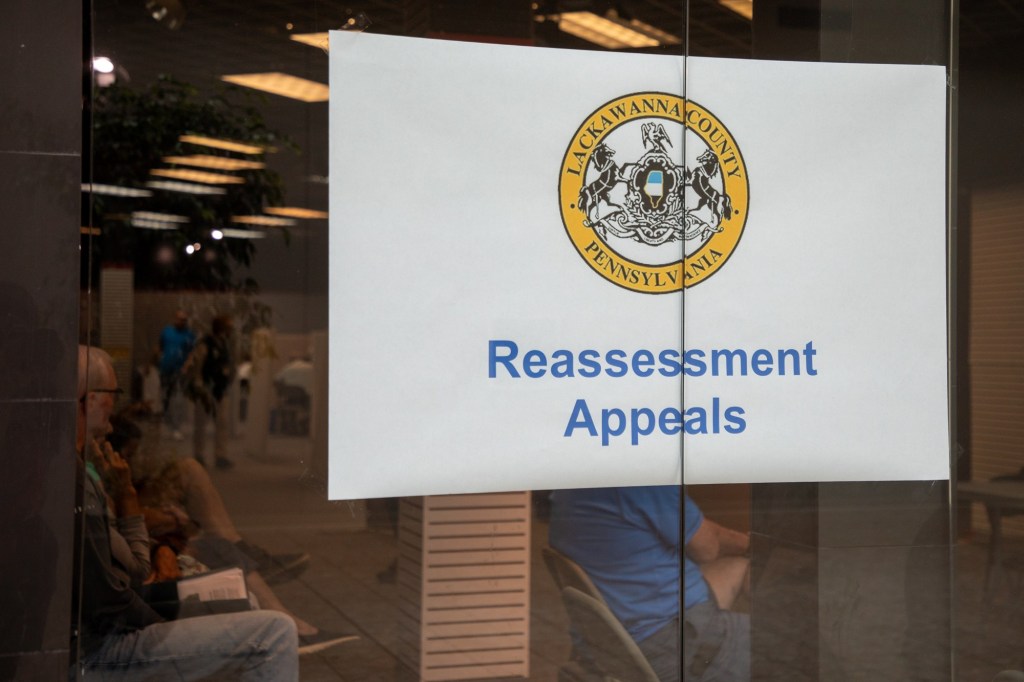Lackawanna County’s permanent and auxiliary assessment appeals boards have about 250 to 300 reassessment appeals left to hear this month as the formal appeals process that began in August nears completion, county Assessment Director Patrick Tobin said.
The boards will end up having heard about 4,800 total appeals when the process wraps up at the end of October, he said. Information on the number of appeals resulting in a reduction of a property’s assessed value was not available Monday.
Properties that are or were the subject of formal appeals represent less than 5% of the roughly 102,500 total parcels included in the county’s first comprehensive property reassessment in nearly six decades. The yearslong process began in 2022 when the county hired Tyler Technologies to update assessed property values, which local governments and school districts use to calculate property tax bills, for the first time since 1968.
The goal of reassessment is to restore tax fairness by bringing assessed property values in line with market values. In Lackawanna County the system has become skewed over the past 57 years, resulting in many property owners paying far more than their fair share of property taxes and others paying far less.
As part of finalizing a deal with Tyler, a prior board of commissioners ratified an agreement postponing further action in a lawsuit filed by three taxpayers seeking to compel a reassessment on the basis of tax fairness. Those litigants alleged the county’s 1968 assessments had resulted in disparate taxes on similar properties, creating a disproportionate property tax burden that violates the state constitution’s Uniformity Clause and the Equal Protection Clause of the U.S. Constitution.
Reassessment advocates maintain that the county would likely have lost in court and been forced to reassess anyway had the prior board of commissioners failed to act.
Among other terms, the stipulated court order postponing the litigation states that the county “shall fully complete the Reassessment and implement the final new assessed values for use in all real property taxation in Lackawanna County no later than January 1, 2026.”
That remains the plan despite calls by Republican Commissioner Chris Chermak and at least one candidate in a Nov. 4 special election for commissioner, Democratic former state Rep. Thom Welby, to pause the reassessment amid concern over the accuracy of new values. Democratic Commissioner Bill Gaughan has called the proposed pause infeasible and irresponsible, and the suggestion that the process can be paused at this point “misleading” and “dishonest.”
Certifying reassessed property values for use in 2026 and thereafter won’t require a vote by commissioners, county Solicitor Donald Frederickson said earlier this month. The county assessor’s office will instead certify the new values by a Nov. 15 deadline, enabling them to take effect as planned next year.
It’s unclear if a third commissioner will even be seated by the time the certification takes place, as the winner of the upcoming special election to replace Democrat Matt McGloin won’t take office until after the election results are certified. Welby, the Democratic nominee, faces Republican Chet Merli and independent candidate Michael Cappellini in that contest.
While commissioners presently have “no role to play in implementing the new assessment values,” Frederickson acknowledged earlier this month that a majority of commissioners could theoretically vote not to implement the new values or delay implementation. Such a vote, Frederickson said, would create “chaos” and land the county in court.
Attorney Marielle Macher — the executive director of the nonprofit Community Justice Project who represents the plaintiffs in the reassessment lawsuit that resulted in the stipulated court order — recently said they’d likely move to enforce the order if the county balks at implementing the new values.
Assuming the new, higher assessed values take effect next year as planned, county, school and municipal tax rates will fall to ensure the process is essentially revenue-neutral for taxing bodies. It’s unclear exactly how one’s individual tax bill might change, but a general rule of thumb is that about a third go down with reassessment, a third increase and a third stay more or less the same.
Tobin acknowledged in August that 2026 is likely to be a busy year in terms of assessment appeals, with a potentially high number of property owners expected to challenge their new values after receiving their first post-reassessment tax bills.

